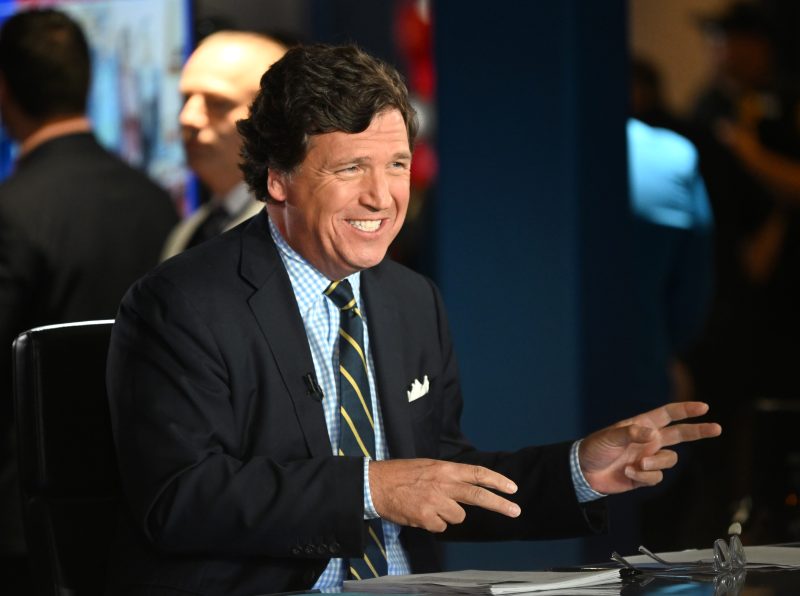As could have been predicted, Fox News is fully onboard with Elon Musk’s effort to cast pre-Musk Twitter as a cesspool of left-leaning machinations. Since Musk began pairing with right-leaning writers to plunk internal documents from the company into a stew of unproven allegations, Fox News and Fox Business have mentioned the efforts of two of those writers more than 1,000 times. CNN, MSNBC, Bloomberg and CNBC, recognizing the limited scope of the revelations, have mentioned them 100 times — combined.
On Tuesday night, Fox News host Tucker Carlson took things a step further. He used a subset of the revelations about Twitter to present his own conspiracy theory about the company — and then used that to elevate an entire battery of other conspiracy theories, most of which are no more mysterious than why the sun sets in the west.
The focus of Carlson’s innuendo was that Twitter employed a number of people who at one time had worked for intelligence agencies or the government — at least 50 of them, he claimed.
“We know that James Baker, who came from the FBI, has been accused of secretly censoring incriminating internal files before Elon Musk could release them to the public,” Carlson said, offering his first example. “Baker was fired for that, so that’s some of what James Baker was doing at Twitter.”
If you’ve been paying close attention to Twitter’s recent travails, you’ll see the flaw here. Baker, former general counsel at the FBI, became a target of the American right as part of the Donald-Trump-led blowback against the Russia investigation. When Musk began releasing files publicly through those writers, Baker — then employed as the company’s deputy general counsel — was reportedly vetting the material, very much in keeping with what corporate legal staff does. But Baker was fired not because he was “accused” — mostly by existing right-wing critics — of censoring info but, according to Musk, because he was involved in the decision-making process that led to a New York Post article being limited on Twitter in October 2020.
But Carlson was warming up to an “intelligence officials are interwoven into Twitter” narrative, so precise articulation of what occurred wasn’t really important. Next, Carlson brought up Charles Smith, who had worked at U.S. Cyber Command — the Defense Department component focused on the internet. In May, Smith joined Twitter’s Trust and Safety team — the company’s department tasked with combating abuse and misinformation. That includes misinformation about elections, Smith’s focus at Cyber Command.
“What were these people doing all day in what was supposedly a social media company?” Carlson asked, referring to them as “spies.” Well, the fair presumption in Baker’s case was “providing legal advice.” And in Smith’s, “preventing malignant behavior.”
The reason Carlson was warning about all of the “spies” at Twitter was that he wanted to suggest that there was good reason for intelligence officials to be embedding at the company. Not just to spy on dissidents, as was the case with an employee found to have turned over information to the Saudi Arabian government. But to leverage Twitter, which Carlson described as “maybe primarily a propaganda tool and intelligence-gathering apparatus for a variety of intel agencies,” given the propensity of “some of the world’s most prominent people” to use it as a “private text app.”
What might be gleaned with access to the platform’s direct messages? Carlson has some ideas!
“Information about big history-shaping events,” he said. “The sabotage from Nord Stream 2, for example. The supposed poison-gas attacks in Syria, both of them. The imprisonment of Julian Assange. Why is he there? The theft of incriminating emails from the [Democratic National Committee]. What was that story? The motive behind the Russian invasion of Ukraine. And much, much more.”
These are the conspiracy theories within Carlson’s meta-conspiracy theory about the intelligence community’s omnipresence. They are there because the answers to these questions might be there! It all falls into place!
Except, of course, that most of these questions have already been satisfactorily answered.
We don’t know who sabotaged the Nord Stream pipelines (actually Nord Stream 1 and 2), but indications are that it was likely Russia. We do know that the questions about the “supposed” chemical attacks on enemies of the Russian-backed Syrian regime — questions raised by frequent Carlson guest Tulsi Gabbard — have been addressed at length and in great detail. We know why Assange is in prison: He was indicted by a federal grand jury during the Trump administration and is awaiting extradition.
That runs parallel to the question about the emails from the DNC. They were stolen in 2016 by agents of the Russian government, as was established in great detail by special counsel Robert S. Mueller III’s investigation. (Here’s a convenient summary of the initial indictment.) The hackers then worked with Assange’s organization, WikiLeaks, to publish what was stolen.
Carlson concludes with another Russia-centric story: Maybe the motive behind the Russian invasion is hidden in Twitter direct messages?
Let’s just set aside that there is no real question about that motive, given what Russian President Vladimir Putin has said publicly and given months of detailed analysis from people who dedicate more time to the question than preparing teleprompter scripts for cable news. Consider the idea that maybe some Russian government official was, what? Sending a direct message to a colleague admitting their actual intent? Or maybe some European military official slipped up and DM’d his friend to admit to the Nord Stream sabotage? Maybe former attorney general William P. Barr sent a private message to someone detailing the secret motive for jailing Assange?
The point is not coherence. It never is. This is why Carlson thrives on cable news: If you pause for even a moment to consider how nonsensical his claims are, they collapse.
The point, instead, is suspicion and distrust. To inculcate a sense that maybe those things are open questions. That maybe Twitter was a secret intelligence-gathering operation. That perhaps the tendrils of governmental nefariousness do extend deep into places you’d never expect.
Tucker Carlson’s primary product is fear and distrust. Keep that in mind and his weird, unsupportable leaps of logic become much easier to understand. You can much more easily track how Twitter hiring a guy with expertise in combating election misinformation suddenly becomes evidence that maybe all of these things Russia and its allies stand accused of doing weren’t their fault at all.








